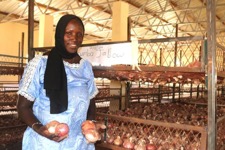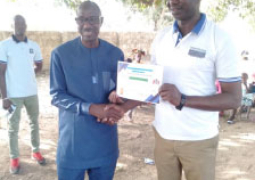
The programme, the beneficiaries said, has greatly empowered them and improved their skills in their quest to increase their onion production in the country.
In an interview with The Point, Khaddy Jatta, from Berefet Community Garden, who is also a beneficiary of the WACOMP programme, underscored the remarkable contribution the project has rendered to farmers, especially those at the rural areas.
“Before the intervention of the WACOMP project,” she explained, “we used to encounter severe post-harvest losses as a result of lack of storage facilities. However, this has now become a thing of the past due to the timely intervention of the project.”
Jatta further said: “We can now store our onions at the storage facility for up to three months without any problem. I can tell you that even if we don’t have customers, our onions can be at the storage facility without any problem.”
She maintained that the project has not only enhanced their onion production, but it has also improved their economic status, adding: “Through this horticulture and onion production, I am able to improve the livelihoods of my family. I am able to feed my family, pay the tuition fees for my children, and eat healthy onions among others. Again, now my earnings have rapidly increased compared to before the intervention of the project.”
Despite the many success stories, she said, they still encounter some challenges which include rampant presence of insecticide in the gardens, especially at the premature stages of their production.
There is also inadequate water at their gardens coupled with the lack of market to sell their onions, she said, claiming: “Currently, our produce is being stored for over three months as the price of onions is very low and unfavourable to us.”
Alhagie Waka John, another onion producer in Pakau Njogu village in the NBR, underscored the transformative changes the project has made in his life, especially from the onion production.
The project has trained and provided them with the necessary skills in onion production, from packaging to storage facilities, he said, adding that it has also led to the increase of his production and harvest.
“Before the intervention of the project, I used to harvest 35 to 45 bags of onions. However, this number has significantly improved. In fact, due to the earnings I am getting from my onion production, I have been able to build a house,” he appreciated.
Ramatoulie Gigo, director of Horticultural Services under the Ministry of Agriculture, Livestock and Food Security, said: “80% of households in the country consume onions, either for breakfast, lunch or dinner.”
With a good market in the country, she said, onion producers would not be in a hurry to sell their products at a giveaway price.
According to her, the late start of onion production in the country is among the challenges affecting onion production in the Gambia, saying: “Onion producers find it difficult to access quality seeds on time and the seeds are also expensive.”
She reaffirmed the government's continued commitment in enhancing onion production in the country. “Due to the commitment of the government in enhancing onion production in the country, the government put in place a moratorium on onion importation with the desire of promoting local produce,” she pointed out.
Concluding, she said the Ministry of Agriculture through the GIRAV project, has been giving grants to Small and Medium Enterprises (SMEs), including onion producers, in their quest to empowering their production capacity.
Malamin Drammeh, WACOMP Horticultural Expert, claimed that before the intervention of the project, they had conducted a Rapid Market Analysis (RMA) throughout the country with the aim of knowing the constraint onion farmers are encountering.
“Through the assessment,” he said, “we were able to visit WACOMP project intervention sites, discussed with onion producers with the desire of knowing their level of understanding on onion production. This has helped the project to come out with a good strategy that will enhance onion production in the country.
“During our assessment and discussion with onion farmers in the country, we understand that farmers had basic knowledge on onion production but generally lacked knowledge on post-harvest handling.
“As a project, our intervention was on post-harvest handling of onions. However, our findings triggered us to address the knowledge gap of post-harvest. The project also worked with horticultural experts in order to review the draft farmer school manual on horticulture.”
The review, he went on, was crucial as it enabled agriculture extension workers to use the manual to train farmers on new farming techniques in onion production.
The WACOMP horticultural expert said also the project has led to bumper harvests due to the adoption of best practices by producers.





